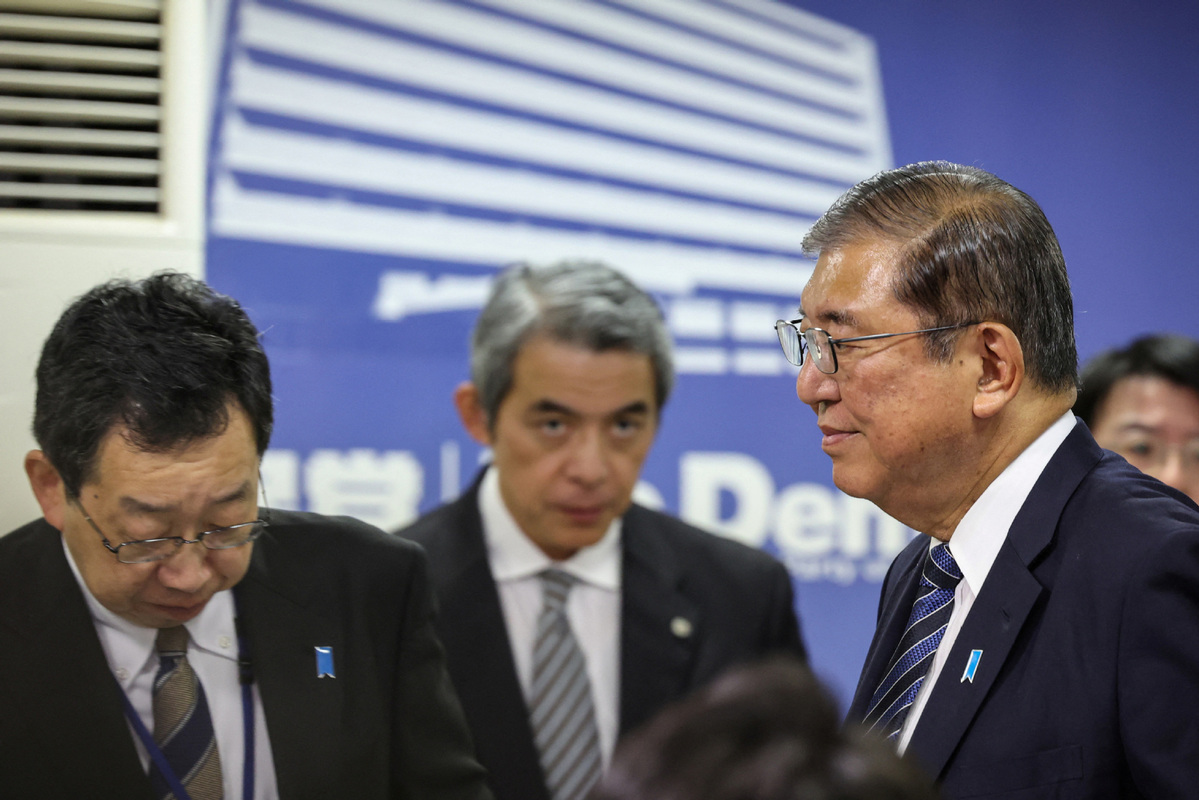Japanese go to polls in neck-and-neck race
Experts point to challenges facing govt after House of Representatives election
By JIANG XUEQING in Tokyo | China Daily | Updated: 2024-10-28 06:59

The voting for Japan's House of Representatives election concluded on Sunday evening, amid public distrust following a major slush fund scandal of the ruling Liberal Democratic Party.
Exit polls from major Japanese media outlets suggest that the LDP is likely to see a significant decrease from its preelection 247 seats, casting doubt on whether the party and its coalition partner Komeito can retain a majority of 233 seats.
As of 11:30 pm in Tokyo, the LDP and Komeito had won 136 and 17 seats, respectively, while opposition parties and others had secured a total of 179 seats, according to broadcaster NHK.
Election results were expected between late Sunday night and early Monday morning. By press time, it was still not released.
If the ruling coalition falls short of a majority, it may need to seek new partners for a coalition or operate as a minority government.
"The question is what comes after that. Prime Minister (Shigeru) Ishiba may not quit so easily, and there can be a certain sort of cooperation with the opposition parties. But in any event, it will not be easy to form a coalition," said Izuru Makihara, professor at the Research Center for Advanced Science and Technology at the University of Tokyo.
"The question remains whether Ishiba is able to muddle through step by step. It will be something to watch closely," Makihara added.
In the election, 1,344 candidates are competing — an increase of 293 from 2021 — for a total of 465 seats, with 289 in single-member districts and 176 through proportional representation. Before the election, the ruling coalition held a combined 279 seats, with 247 held by the LDP and 32 by Komeito.
During the campaign, controversies surrounding the LDP faction's "politics and money" became a focal point. In a high-burden society, public criticism of political funding issues has intensified. Following the rise in the consumption tax rate to 10 percent and the introduction of the invoice tax filing system, taxpayers — who are required to diligently collect and report receipts — are increasingly frustrated by the leeway granted to politicians.
"There's a growing sense of egalitarianism that does not condone political privilege and a strong pursuit for fairness," Makihara said.
During a speech on Saturday in front of Tokyo's Ikebukuro Station, Yoshihiko Noda, leader of the Constitutional Democratic Party of Japan, said, "Will we continue with dark money politics, or will we end it? That's what this election is about."
According to Noda, the issue of "dark money" represents more than political reform; it's about taking the first step toward changing how funds are handled in Japanese politics. He warned a system that favors a privileged elite leads to reliance on specific groups or individuals, generating debts and pushing those in power to cling tightly to it. This results in an unfair, inefficient allocation of funds, which ultimately contributes to national decline.
The CDP has committed to abolishing corporate and organizational donations, making tuition at national and public universities free, and implementing a consumption tax refund system for low-income households. However, both the CDP and the LDP face challenges in maintaining internal governance without such political funds, Makihara observed, adding that how to build internal governance is now a pressing issue for both the ruling and opposition parties.
In a statement on Sunday, the LDP acknowledged the pressing challenges Japan faces in areas such as the economy, security, and population decline, reaffirming its commitment to achieving national revitalization.
On the final day of campaigning, Ishiba, serving as LDP president, focused on speeches across seven Tokyo locations where LDP candidates face strong competition from opposition parties.
Late in the campaign, a controversy arose over the LDP's decision to allocate 20 million yen ($131,334) in operational expenses to the branches of candidates who were not officially endorsed due to political funding issues. However, Ishiba did not address this matter in his closing remarks in Koto Ward.
On Sunday, the Japan Innovation Party released a statement calling for an end to money-in-politics issues and reforms in social security, education, and regulations to eliminate generational disparities. Speaking in Sakai, Osaka Prefecture, on Saturday, Nobuyuki Baba, the party's leader, stressed the need for a party that could give the LDP a wake-up call, tightening its lax discipline regarding political funding issues.
























